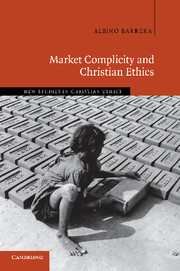Book contents
- Frontmatter
- Contents
- General editor's preface
- Acknowledgments
- Introduction
- PART I THEORY: MATERIAL COOPERATION IN ECONOMIC LIFE
- PART II APPLICATION: A TYPOLOGY OF MARKET-MEDIATED COMPLICITY
- PART III SYNTHESIS AND CONCLUSIONS
- 9 Toward a theology of economic responsibility
- 10 Synthesis: Christian ethics and blameworthy material cooperation
- References
- Index
10 - Synthesis: Christian ethics and blameworthy material cooperation
Published online by Cambridge University Press: 16 May 2011
- Frontmatter
- Contents
- General editor's preface
- Acknowledgments
- Introduction
- PART I THEORY: MATERIAL COOPERATION IN ECONOMIC LIFE
- PART II APPLICATION: A TYPOLOGY OF MARKET-MEDIATED COMPLICITY
- PART III SYNTHESIS AND CONCLUSIONS
- 9 Toward a theology of economic responsibility
- 10 Synthesis: Christian ethics and blameworthy material cooperation
- References
- Index
Summary
While Christian moral theology has much to offer on questions of material cooperation in bioethics or war, it has done little when it comes to economic life. To my knowledge, there is no extended treatment in Christian ethics to date on the problem of blameworthy material cooperation in economic wrongdoing or in accumulative harms. This disparity in treatment is not due to a lack of awareness of the problem of economic complicity. As mentioned earlier, John Chrysostom (1971, nos. 110–112) and John Wesley (1872) were concerned that their congregants not engage in trades or occupations that were injurious to the well-being of others. St. Elizabeth of Hungary abstained from food and drink that were unjustly acquired from peasants. Abolitionists were keenly aware that to patronize slave-grown sugar was to be tainted with the evils of the slave trade.
In appealing to the First World to be more solicitous of the poor countries in his social encyclical Populorum Progressio, Paul VI (1967, no. 47) alluded to the wealthy nations' duty to provide a fair, if higher, price for the exports of Third World nations. In effect, he was arguing that First World consumers are morally responsible for the work and pay conditions of laborers in developing countries who supply their needs. Later, John Paul II (1981, nos. 77–81) spoke of the indirect employer in Laborem Exercens. Unfortunately, he did not develop in greater depth who precisely is an indirect employer and why.
- Type
- Chapter
- Information
- Market Complicity and Christian Ethics , pp. 266 - 285Publisher: Cambridge University PressPrint publication year: 2011



